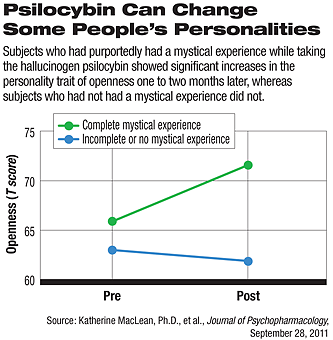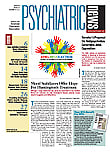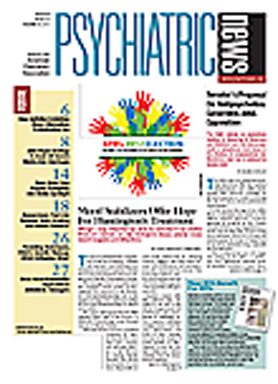Psilocybin is a compound present in many species of mushroom, most belonging to the genus Psilocybe. Psilocybin is also a hallucinogen. And ingesting it can increase the personality trait of openness in people prone to mystical experiences, a new study suggests.
The study was conducted by Johns Hopkins University School of Medicine researchers Katherine MacLean, Ph.D., a postdoctoral research fellow in psychiatry; Matthew Johnson, Ph.D., an assistant professor of psychiatry; and Roland Griffiths, Ph.D., a professor of psychiatry. The results appeared online September 28 in the Journal of Psychopharmacology.
“Given the relatively unchanging nature of personality in adulthood, this is a rather remarkable finding,” Charles Grob, M.D., told Psychiatric News. Grob, a professor of psychiatry and pediatrics at Harbor-UCLA Medical Center in Los Angeles, recently published a study on the use of psilocybin in subjects anxious about a cancer diagnosis, but had no involvement with this particular study.
“This paper will certainly prompt a lot of interest due to the fascination with possibilities for transcendence through altered states of consciousness,” James Griffith, M.D., told Psychiatric News. In addition to being a professor of psychiatry and neurology at George Washington University, Griffith is author of the book Religion That Heals, Religion That Harms.
“[However,] a particular complaint that I have about this and similar studies is the superficiality with which terms such as ‘mystical’ and ‘spiritual’ are used,” Griffith said. “Episodes of depersonalization are often encountered in many people’s lives, triggered either by stress, illness, or external agents such as drugs. They don’t deserve the description ‘mystical.’ The heart of authentic mystical experience is a transformation of meaning that involves relationships with other people . . . not just production of subjective positive feelings of bliss or ‘oneness with the universe.’ ”
Subjects Recruited By Flyers
Fifty-two healthy, well-educated subjects aged 24 to 64 were recruited from the community by flyers announcing a “study of states of consciousness brought about by psilocybin, a naturally occurring psychoactive substance used sacramentally in some cultures.” The participants did not receive monetary compensation for participating, but generally reported that they were motivated to participate by curiosity about the effects of psilocybin and the opportunity for self-reflection. Ninety-percent self-identified as spiritually active—for example, regularly praying, meditating, or participating in religious services.
The subjects were evaluated with the NEO Personality Inventory for five broad domains of personality—neuroticism, extroversion, openness, agreeableness, and conscientiousness. They were then given a high dose of psilocybin (30 mg/70 kg). They were reevaluated one to two months later and again more than a year later to determine whether the psilocybin session had brought about any personality change.
One to two months after the subjects had received psilocybin, the assessment did not show any significant changes in neuroticism, extroversion, agreeableness, or conscientiousness. But the 30 out of 52 subjects who had incurred what seemed to be a mystical experience during their psilocybin session indicated a significant increase in the trait of openness. And in these subjects, openness remained significantly higher than baseline more than a year after the session.
“Given that no other study had documented personality change after a discrete laboratory event, I was surprised to see increases in openness traits following a single high dose of psilocybin,” MacLean told Psychiatric News. “I was even more surprised that this increase lasted through the 14-month follow-up. On the other hand, it’s not surprising when you consider what a truly big life event these psilocybin sessions can be for people. The majority of our participants viewed their psilocybin experience as one of the top five or 10 most personally meaningful and spiritually significant experiences of their lives.”
Psilocybin Also Triggered Fear
The psilocybin session did prompt strong fear or anxiety in almost 40 percent of participants at some point during the session, MacLean noted. So in this sense, the session certainly provoked “acutely undesirable effects,” she admitted. “However, no participants at the 14-month follow-up reported that the sessions had harmed them, and most participants viewed the experience as positive in the long run.”
Although the results don’t have any direct clinical implications, they may be viewed as promising in that “they open up all sorts of new avenues for research into the potentially therapeutic benefits of psilocybin and other classic hallucinogens,” MacLean commented. For example, “although we didn’t see changes in personality traits other than those falling within the openness domain, it’s possible that psilocybin might decrease maladaptive traits in people who are more depressed, anxious, tense, aggressive, or impulsive than our volunteers were.”
These characteristics fall under the personality trait of neuroticism, she noted. And “the findings suggest that mystical or spiritual experiences might have real-world benefits in terms of positive changes in certain traits, attitudes, and behaviors.”
She and her colleagues are conducting several other psilocybin studies. For example, they are looking to see whether adding psilocybin to cognitive-behavioral therapy can help people quit smoking. They are examining the effects of psilocybin on individuals who are experiencing anxiety or depression due to their cancer diagnosis and are exploring the combined effects of psilocybin and daily meditation on healthy volunteers.
“In the future, we will be examining the effects of psilocybin on people of different religious or spiritual backgrounds, such as long-term Buddhist meditators,” she reported. “So it’s possible that we’ll soon have more to say about the religious implications of psilocybin use.”
The study was funded by the National Institute on Drug Abuse, Council on Spiritual Practices, Heffter Research Institute, and Betsy Gordon Foundation.


